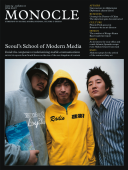
Issue 4
Seoul’s School of Modern Media: Inside the companies revolutionising mobile communications. Monocle reports from South Korea on the rise of the new kingdom of content.
In This Issue
Oops! No content was found.
Looks like we no longer have content for the page you're on. Perhaps try a search?
Return Home

